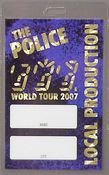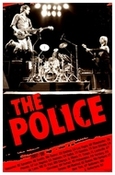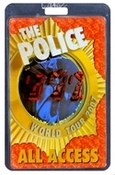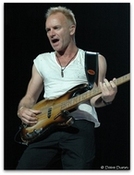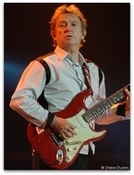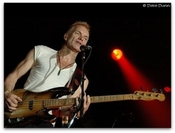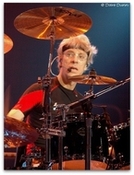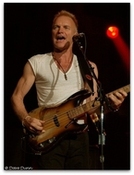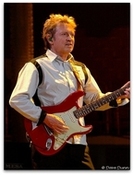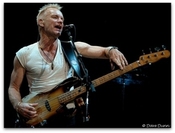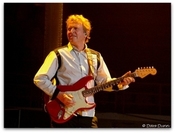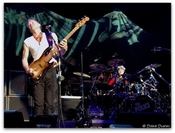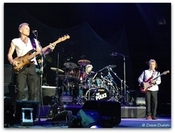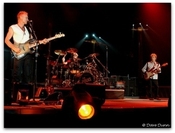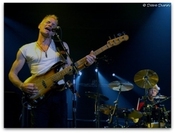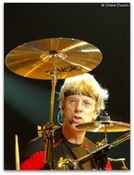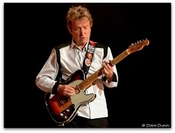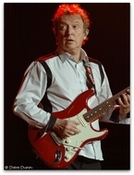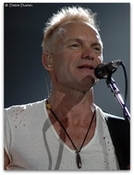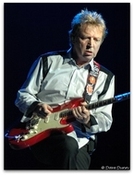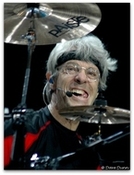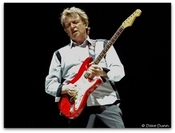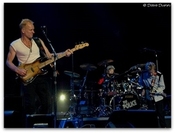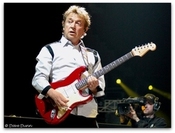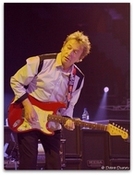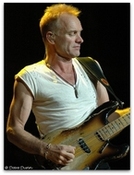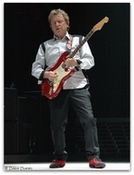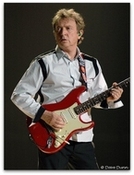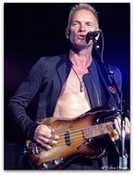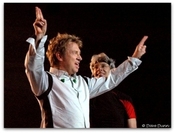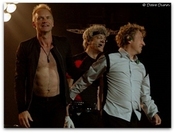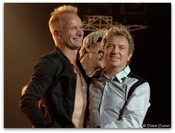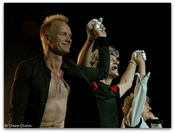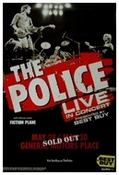
Still top of the cops...
The Police have reunited for their first world tour in 23 years. This isn't a record Cream reunited in 2005 after 36 years but the gap feels longer than it is, perhaps because The Police's original stint is widely believed to have ended in acrimony.
Some 1.5million tickets have been sold, for £84million, and there's a frisson in the crisp Pacific air as the first show approaches.
It will be a story either way, whether the evening ends in hugs or glowers.
The Police's hits are staples of oldie radio and plenty of young people are here, many with their parents. Among them is Joe Sumner, singer with the support act, Fiction Plane: his father is Sting.
It can't be easy having a dad who's that famous, or that fit. Sting comes bouncing out looking even more toned than usual.
With his white T-shirt, black drainpipes and rippling biceps, he's a very buff old buffer.
Andy Summers and Stewart Copeland have aged well, too. They have all their hair, although Copeland has gone grey, got glasses and is wearing the inadvisably closefitting top of the midlife cyclist.
Everybody is trim: the only inch of flab in the whole band is Summers's double chin.
At 64, he has earned it.
They start with 'Message In A Bottle', an instant thrill. They've been rehearsing for two months and it shows: they're as tight as Sting's trousers.
Copeland is a powerhouse at the drum kit, while Sting and Summers ooze relaxed concentration, like sportsmen who are trying hard not to try too hard.
They end with a synchronised jump and the crowd goes wild. In mid-ovation, Sting takes a swig from a mug 'something herby', his publicist reckons. The jump is straight from The Police's post-punk roots; the tea shows how far they have travelled since. The whole gig is rather like that, mixing the punchy pop-reggae of the hits with the sophisticated noodling that came to dominate their albums.
After a second track, the propulsive Synchronicity II, Sting says he'd like to introduce the band: 'Andy, this is Stewart.' It's a clever way to deal with the passing decades.
Later they shower each other with praise: 'on drums, the incredible Mr Stewart Copeland'; 'on vocals, the amazing Sting'.
Even their compliments are competitive.
'We've got all these famous songs,' Summers had told the local paper, ominously, 'but we look at them like new pieces of material... We spent the last two months fiddling around until we felt it was good.' The fans, who have paid more than £100, may have felt it was good enough already, but reuniting is one thing and reproducing records another. It would be unfair to expect every little thing they do to be just as it was.
The results are mixed. 'Don't Stand So Close To Me' is slowed down and thrown away, 'Walking On The Moon' is more ambient and less angular, 'Truth Hits Everybody' is drearily rocky and 'Every Little Thing She Does Is Magic' combines a fizzing energy with some intricate decorative work from Copeland, now standing at something resembling the musical instrument stall in a souk.
The songs that work best are mostly the simpler ones 'De Do Do Do, De Da Da Da', cheesy but nice, and 'So Lonely', glum but cheery. 'Roxanne' could be simple too, but after a strong start it drifts off into the land of noodle and loses momentum.
Sting sings better than he ever did in 1978 and The Police's sound comes through undated, perhaps because it was so quirky in the first place. The anachronisms in the lyrics 'my LP records', 'an Armalite' just add to the charm.
The staging is stylishly minimal, with strong close-ups on the big screen to convey Copeland's eye-bulging delight, Summers's studious virtuosity and Sting's hammy facepulling. It's not easy to dance with a bass guitar, but he tries it briefly and manages an endearing silliness.
All that's missing is an emotional punch to match the opening. It finally comes when they play 'Every Breath You Take', with its debonair menace and perfect rounded melody. The evening ends in hugs.
(c) Mail on Sunday by Tim de Lisle
The Police's Reinvestigation...
The members of the Police - Stewart Copeland, Andy Summers and Gordon Sumner, better known as Sting - were already young veterans of the British music scene when they first performed together on May 28, 1977. Wise middle-aged veterans now, they played no new material during Monday's 30th-anniversary reunion concert here, a 110-minute show that officially kicked off their lengthy tour. Instead, they enriched their music by stripping away much of the familiar bombast and pop trappings to expose the songs' raw structures and rebuild them in unexpected ways.
Four months of rehearsals began with the men running through a repertoire culled from five albums to gauge how their evolution as musicians had changed their approach to the material, Mr. Copeland said when we spoke by phone a few days before opening night. Sting, he noted, has been playing these songs for decades, though often with arrangements that differed from the band's recordings. ''So we originally had to come back to the Police versions,'' Mr. Copeland said. Then, he added, ''we've been reworking those songs into a new pocket,'' using a musician's term for a groove.
Musicianship is at the core of the trio's relationship and the Police's enduring legacy. When they first formed the band, Sting had been playing jazz fusion, Mr. Copeland progressive rock and Mr. Summers was a seasoned sideman. Their refined skills put them at odds with the energetic but musically undemanding punk scene in the U.K., but they also gave them a way to make interesting commercially minded music that drew on reggae rhythms and a jazz-like sensibility. At their peak, the Police were a band you could sing along to - or you could ignore their melodies completely and still find the music fascinating. And they sold some 50 million albums world-wide.
After the band splintered in 1985, Sting became a pop-music superstar in his own right, bringing jazz and world-music inflections to his increasingly urbane songs. Mr. Copeland composed orchestral works and film and TV scores, and he drummed with the legendary jazz-fusion bassist Stanley Clarke and, later, Oysterhead, a rock trio featuring Primus bassist Les Claypool and Phish guitarist Trey Anastasio. Mr. Summers wrote film and TV scores, and he recorded a string of intriguing albums, including a Thelonious Monk tribute. ''The stature of the original Police made it possible for us to work with the best of the best of the best,'' Mr. Copeland said.
For Mr. Copeland, the appeal of a reunion is blending what he called Sting's ''raw animal power'' with Mr. Summers's sophisticated approach to guitar. As for his role as the band's engine, he said, ''I'm driving us back into rock. That's the art form where we can distill ideas.''
Their evolution as musicians was apparent early in the Vancouver set, as the trio went to work on a frill-free monochrome stage on which Mr. Copeland's expanded drum kit was bracketed by a wall of amplifiers. Their third number, 'Spirits in the Material World', hinted at the night's possibilities: Mr. Summers relaxed the staccato chording he featured on the original and left the responsibility for the midsection up for grabs. Throughout the song, while Mr. Copeland played deft figures on the cymbals or slammed the snare, his band mates alternated roles exploring the middle and holding down the bottom, approximating the familiar riffs on the disk but going elsewhere when the opportunity arose.
But as the show progressed, filling the midsection no longer seemed an objective. In 'Walking On The Moon', Sting and Mr. Copeland created a tense platform for Mr. Summers. But rather than soloing, he joined the rhythm section, keeping the tension alive until Sting resumed the verse. Similarly, at times only Mr. Copeland's cymbals relieved the rumble at the bottom of 'Every Little Thing She Does'. Mr. Summers's punchy playing on 'De Do Do Do, De Da Da Da' gave way to an alluring bass pattern by Sting that the band wisely extended.
On vocals, Sting often held back - crooning where in the past he'd shouted, and muting his energy to pull the audience into the mystery of the new arrangements. In strong voice throughout the evening, Sting kept the verse and chorus at the same level during 'Don't Stand So Close', and his measured reading of 'Invisible Sun' gave it an ominous tone. His staid approach to 'King of Pain' changed its focus and liberated it, making the song far more affecting.
Sting's melodies are so strong that thorough deconstruction doesn't alienate the songs from their pop roots. On a muted 'Walking in Your Footsteps' that drifted far from its original structure, Mr. Summers finally anchored it in rock with a snarling solo. 'Wrapped Around Your Finger' was built on Mr. Copeland's melodic playing on chimes, bells and kettle drums. In both cases, the audience sang along as if little had changed.
Which isn't to say the band set out to distance itself completely from its classic sound. The opening number, 'Message In A Bottle', as well as 'Roxanne' and 'Can't Stand Losing You', were faithfully rendered. Nor did everything work exceptionally well: Several songs seemed to wane, as if the trio couldn't find a foothold, reminding the audience that it was opening night and that no amount of rehearsal will reveal what will work on stage when risk is at play.
But when the group chose to add delicate textures or create suspense off a single chord, it showed how well something new suits something familiar, and how experience and a sense of adventure can drive musicians forward.
(c) Wall Street Journal by Jim Fusilli
Police at GM Place, Vancouver...
When you have spent the official price of $220 Canadian dollars for a ticket to see the band that soundtracked your youth, is there any other option but to enjoy yourself? Seemingly not.
Twenty-two years after the Police dissolved in a mire of acrimony, their first date of this mammoth reunion tour had all but a handful of the 20,000 fans at this ice hockey stadium standing from the beginning. Were those fans so inclined - say, during the more protracted instrumental sections of 'Walking In Your Footsteps' - they could have done the maths on a 21-song set and worked out that they had spent more than dollars per song. But, then, perhaps it's crass to put a price tag on an unforgettable evening. It may be a material world, but as one of the evening's more familiar songs served to remind us, we are spirits in it.
Besides, if you wanted to be crude about it, some songs performed well for the money. With the three huge screens over the stage yet to flicker into life, the jukebox-precise accuracy with which the Police played 'Message In A Bottle' ferried you straight back to 1979. There was some narrative sense in playing the song ahead of everything else. Five months before the song's original release, the Police played the nearby Commodore Ballroom only to be booed off stage. Sting must have derived some poetic gratification, then, from having his hundred million bottles returned with such vocal gusto.
At times, the creative tensions which characterised the Police's nine years together worked to their advantage. Stewart Copeland's syncopations and fills ensured that 'Every Little Thing She Does Is Magic' stopped short of sounding banal. As he busied himself, the 56-year-old former schoolteacher out front proceeded to do that baffling thing which he spent so much of the Police's first incarnation doing - stepping out to the front of the stage and getting the audience to join in with his famous ''aaay-o'' reggae yodel.
Other songs were harder to follow because the Police seemed to have forgotten how to play them. Twenty-one years ago, the original recording of 'Don't Stand So Close To Me' - in which Sting famously rhymed Nabokov with ''shake and cough'' - troubled the singer so much that the Police re-recorded it as a farewell single. In Vancouver that dodgy couplet was the least of the song's problems. Sounding not so much off-key as avant-garde, the band seemed so embarrassed by what they had done to it that they steamed straight into the furrow-browed conscience rock of 'Driven To Tears', to no greater avail. It was a slough that highlighted a problem unique to a group of the Police's stature.
With virtually no bands in their wake citing their five albums as an influence, the Police remain a group remembered for the quality of their singles. Good as those singles were, there simply weren't enough of them to fill a two-hour show. Perhaps by way of compensation, the tanned, muscular frontman mounted the drum riser for 'When the World Is Running Down' and wiggled a pair of buttocks that could crack a walnut with a mere twitch. While thousands of Canadian women sighed contentedly, countless Canadian men in freshly-starched polo shirts nodded sagely to Andy Summers's bluesy soloing.
With a good tune at their disposal though, you could forgive the Police anything. 'Wrapped Around Your Finger' was a dark triumph; as a hydraulic podium lifted Copeland to his own little percussion grotto it served to remind you how peculiarly gloomy many of the Police's big hits were. Paradoxically, the ''feel-good'' climax to the show saw several of their darkest songs played in quick succession.
For the duration of 'Invisible Sun', the sight of Sting in a sleeveless white top gave way to even more distressing scenes. Now that the song had helped to solve the troubles in Northern Ireland, monochrome footage of life in Middle East war zones accentuated the febrile, sluggish manner in which they played it.
Such is the yearning magic of 'Roxanne' that not even Sting's determination to set off yet another round of reggae yodelling diminished its magnificence. It was, of course, this song that Alex Turner referenced in Arctic Monkeys' 'When the Sun Goes Down'.
The uncool truth is that, at their early best, Sting's songs had enough poetry in their soul and enough soul in their poetry to stand alongside the new vanguard of pop wordsmiths. As a solo artist, though, he has struggled to find musicians willing to square up to him and his loftier conceits. In the Police - a band made and broken by musical differences - that was never an issue.
As the Police departed the stage after a rapturously received 'Every Breath You Take', there was an unprecedented bout of group hugs. One night down; 71 to go. Better keep some hugs in reserve.
(c) The Times by Pete Paphides
The Police bury the hatchet, starting in Vancouver...
Nearly a quarter-century has passed since the Police sang their last official note. Hope, or perhaps boredom, has now brought them back together. And when the legendary eighties trio kicked off their world reunion tour in Vancouver on Monday night, Sting, Stewart Copeland and Andy Summers were clearly castaways no more.
The sold-out crowd at General Motors Place - more than 20,000 ecstatic fans strong - screamed their appreciation as the band dove into 'Message In A Bottle' to start off a two-hour concert that breathed new life into a largely rearranged hit list.
The band didn't write any new material for the 100-date tour, but anyone who was expecting the furious punk-flamed reggae rock of the Police in their prime was in for a sedate surprise. Many of the songs were retooled with a mellower, jazzier, tropical-island vibe.
A melodic version of 'Wrapped Around Your Finger' received one of the most dramatic rearrangements, capped by Copeland racing back and forth between twinkly chimes, xylophone and drums on his elaborate raised percussion platform.
Sting gave 'Walking On The Moon' a slow hypnotic bass line. Summers reggaed up the guitar for a slinky, nearly unrecognizable 'Every Little Thing She Does is Magic', then let loose in a smashing solo during a medley of 'Voices in My Head'/'When The World Is Running Down'.
'Walking In Your Footsteps' started off slow, then flipped hard and fast, after Copeland stepped out from behind the drum set to run across the stage, screaming like a maniac.
''Stewart, stay!'' Sting joked, much to the crowd's delight.
'Truth Hits Everybody', 'Spirits in the Material World' and 'Driven To Tears' could have used some of that same speed.
''This is our first official concert in 25 years,'' Sting announced, although it seemed hardly necessary, considering how many devoted fans, having travelled from and wide, shelled out 5 for the best seats in the house.
''We chose Vancouver because you're Vancouver, alright?'' the lead singer said, as if that were self-explanatory.
''I like this city very much,'' he added.
The Police have been rehearsing in Vancouver on and off since January, when the first rumours of a reunion tour began to surface. The band, which sold a staggering 50 million albums during a seven-year career, parted ways in 1984, after the last date of its 'Synchronicity' world tour.
The infamous feuds that fuelled the break-up have obviously been set aside. The band seemed genuinely happy to be onstage together and shared many laughs with the audience. 'Don't Stand So Close To Me', for instance, took on new meaning when Sting introduced the song by spraying breath mint in his mouth and sniffed his armpit.
Sting, now 55, was divinely slithery - in a sexy Sanskrit serpent, Kundalini yoga kind of way - with his rippling biceps, piercing blue eyes and wiggling hips. Copeland, 54, was the ''sporty'' cop in a retro headband, cycling shirt and golf gloves. He gave the crashing performance of his career. Summers, 64, was as low-key as ever. Dressed in pressed slacks and a silk shirt, he almost looked like a stockbroker who had thrown off his tie to kick out the jams.
The show was a relatively stripped down affair - ''just three guys and a stage,'' as Sting had promised at a press conference earlier this year.
There was no proscenium or backdrop on the split-level oval floor. The special effects were mostly limited to the raised platform and flashing lights. Later on, during 'Roxanne', the entire stadium was bathed in a red glow. And for 'Invisible Sun', a video suddenly appeared on the six jumbo screens above the stage, playing clips of war-torn Iraq and people drinking from muddy pools. A subtle reference, perhaps, to WaterAid, the official tour charity.
By the end of the night, that old familiar Police magic was back in full force. 'King of Pain', 'So Lonely' and 'Every Breath You Take' rounded out the first encore. Urged on by thunderous applause, the band returned to end the concert with driving rock version of 'Next To You' and a boisterous round of hugs for each other.
The boys had better hang on to that love. They've still got about 99 concerts and six continents to go.
(c) The Globe & Mail by Alexandra Gill
The Police return to rock Vancouver...
It appears to be an immutable law of rock and roll that every former band, no matter how dysfunctional and personally incompatible, must eventually reform.
After twenty-one years apart, The Police finally fulfilled their duty, taking to the stage for the first of two sold-out nights at the 20,000 seater GM Centre in Vancouver, Canada, to launch their comeback world tour.
It had been such a long time that Sting (apparently the officer in charge) felt it necessary to introduce his bandmates to each other. ''Andy, this is Stewart,'' he joked. Well, I think he was joking.
The Police were never so much a power trio as a power struggle trio. Although the three virtuoso musicians use the primary instruments of rock and roll (drums, bass, electric guitar and voice), they don't so much meld together into a tight, cohesive force as continually pull apart, each straining to take the songs in a different direction.
With atmospheric guitarist Andy Summers, wildly percussive drummer Stewart Copeland and even Sting himself embarking on structural, rhythmic and melodic digressions from and excursions around the central themes of what, in essence, are incredibly succinct and classically structured songs, this is as close to jazz as pop gets.
The effect is like Cream reinterpreting the Beatles. At its best it is hypnotically mesmerising, sucking you into a sonic and harmonic jigsaw of musical interaction before delivering you back to the comfort zone of the chorus.
At its worst, or at least its most self-indulgent, it is baffling, and not only to the audience. ''I don't recognise that, what are we doing?'' Sting mischievously enquired of Summers during one particularly oblique intro.
After so many years doodling about on his own, Summers was clearly relishing the opportunity to doodle in front of an adoring audience, disguising hooklines with echo and ambient effects, and unleashing torrents of frantic solos.
The song in question turned out to be 'Don't Stand So Close To Me', which may have been one of the themes of a surprisingly low-tech event.
Perhaps to emphasise musicianship over showmanship, the only significant concession to modern developments in staging were three giant screens, with a single camera allocated to each band member.
It was instructive how rarely they strayed across the lines to appear in the same shot.
To be honest, anyone could be forgiven for not wanting to get too close to Copeland. Wearing an ill-considered cycling suit, headband and spectacles, and pulling furious gurning faces, the hyperactive percussionist resembles an escapee from an asylum for the criminally insane. I don't think I have ever seen a drummer get so involved in the action of his hi-hats, frequently neglecting the rest of his kit for extended periods, only to suddenly bang the snare drum in the place you would least expect it.
At once polyrhythmic and spacious, he makes few concessions for those sections of the crowd who wish to clap along.
Singalongs were just as frustrating, given Sting's penchant for melodic modulation , although when things were straying too far afield he would lift spirits with a bit of trademark ''ee-yo-ee-yo-yo''ing.
If at times it feels as if there is no centre to The Police, everything is ultimately held together by the sheer force of Sting's charisma.
His band mates may be showing signs of wear and tear, but this walking advertisement for the power of yoga still looks like a rock god, and still commands attention.
His voice has deepened over the years but has a richness and soulfulness that added emotional dimension to slowed down, intimate versions of 'Invisible Sun', 'Wrapped Around Your Finger' and 'King of Pain'.
And on a showstopping 'Roxanne', even his yodelling sounded positively bereft.
A rapturously received set delivered every song a Police fan would want to hear (even if it took a while to identify them all).
If there was a slightly frantic air to much of the proceedings, then it may be simply a case of trying too hard to make up for lost time.
Hopefully, by the time the tour reaches Britain in September, The Police will have developed a more softly softly approach to crowd control.
(c) The Daily Telegraph by Neil McCormick
The Police open their world tour in arresting fashion...
Thousands of frenzied female fans, with equally enthusiastic male companions in tow, screamed and clapped as the 1980s rock supergroup took the stage at General Motors Place for the second kickoff date of the trio's 2007 reunion tour.
A third show Wednesday night is the last in a three-night stand in Vancouver before the group brings hits Edmonton on Saturday and then begins the U.S. leg of its tour with sold-out shows June 6 and 7 at KeyArena in Seattle.
In a woozy spectacle of fan appreciation, nearly 20,000 concertgoers packed GM Place on a night fueled by powerful grooves and heady nostalgia.
With the bang of a gong, drummer Stewart Copeland opened a two-hour-plus show filled with such hits as 'Roxanne', Don't Stand So Close to Me', 'King of Pain', 'Spirits in the Material World' and 'Walking On The Moon' - songs that helped define an era.'
The Police were one of the biggest rock bands of the early 1980s. Bassist Sting, drummer Copeland and lead guitarist Andy Summers called it quits after the group's 'Synchronicity' tour of 1983/84. The band's reunion tour - featuring an unremarkable opening band, Fictionplane - is expected to be among the top-grossing tours this year.
Band members beamed as they took the stage. Sting, in short-cropped, bleach-blond hair, was all smiles as the band launched its opening song, 'Message In A Bottle'. The most famous member of the band, Sting looked mentally and spiritually rejuvenated - and ready to take on the world with more than 100 concerts over the next few months.
Copeland, whose biceps bulged through the sleeves of his red-and-black T-shirt, played with muscular precision on a full array of percussion instruments. Summers, a bit more subdued than his bandmates, resurrected the infectious licks that helped make the group's songs so memorable.
Fans from the band's heyday, now more than 20 years older but eager to relive the glory days, filled nearly every seat at a venue comparable in size to KeyArena. The crowd spanned several generations, from the teens to the 60s. Concertgoers swarmed the merchandise counters, standing in long lines to buy official tour T-shirts priced as high as each.
The circular stage included a raised platform at the rear, three LED video screens, banks of floodlights and dozens of spotlights on long shafts that resembled the space pods from the movie ''War of the Worlds.''
The most colorful songs of the set were 'De Do Do Do, De Da Da Da', during which the stage was bathed in yellow light, and 'Roxanne', offering an explosion of red lighting effects that flooded the arena. The latter, which closed the main set, prompted an audience sing-along.
Sing-alongs were frequent throughout the show, from 'Don't Stand So Close to Me' to 'Every Little Thing She Does Is Magic'. Copeland's percussion was enchantingly exotic during 'Wrapped Around Your Finger'. Sting introduced 'Murder by Numbers' by reminding the audience that the Rev. Jimmy Swaggart had once said the song had been written by the devil.
'Invisible Sun', with its line about ''killing everybody in the human race,'' was accompanied by black-and-white videos of devastation in Iraq. The beautiful, insightful 'Walking in Your Footsteps' featured video imagery of a dinosaur skeleton.
The show went just past 11 p.m., with two encores featuring such songs as 'King of Pain' and 'Every Breath You Take'.
Taking a bow at the end, Sting, Copeland and Summers were clearly happy to be on stage again.
(c) The Seattle Post-Intelligencer by Gene Stout
The Police kick off tour in Vancouver...
Sometimes when old mates haven't spent a lot of quality time together in a while - say, a quarter century or so - they don't want to be encumbered by too many distractions.
So when The Police kicked off their first concert tour since the early '80s on Memorial Day, at GM Place, there was no elaborate stage show, no gospel choir, no celebrity guest stars or venerated sessions players jumping on stage to jam with the band. Instead, Sting, Stewart Copeland and Andy Summers made their reunion a tribute to the muscular but intricate minimalism on which their chemistry was founded.
Granted, that chemistry wasn't always as easy or exuberant as it sounded. It was fitting, in a sense, that The Police would launch their North American trek on a holiday associated with war. A famously fractious outfit in its heyday, the trio combusted after little more than half a decade, during which it produced some of the most accomplished and irresistible pop music of the rock era.
But it was also appropriate that any ego clashes or differences in temperament that likely informed the band's premature demise were nowhere to be seen, or heard, on Monday night. Unlike, say, the Rolling Stones, The Police never affected the air of an eternally adolescent gang; both the camaraderie and the tension between its three members seemed tied to their musical goals and values. And in the end, however distinctive Sting's, Summers' and Copleand's ambitions and contributions, their recordings together were exercises in expert musicianship.
Monday's show was very much in that spirit, with each player supporting and enhancing his colleagues, sometimes subtly, sometimes playfully. Through a set in which they delivered virtually all their old hits - 'Every Breath You Take', 'Don't Stand So Close To Me', 'Every Little Thing She Does Is Magic', 'Message In A Bottle' and 'Roxanne' - the three consistently saluted each other's strengths.
Sting, as the frontman and songwriter - and the Police-man whose instant solo success made the band's split a foregone conclusion - led the proceedings with grace, generosity and humor, introducing Summers as a ''legendary'' guitarist and Copeland as ''the greatest drummer in the world.''
Copeland, who has been regaled with similar praise by more than one modern rock musician, certainly showed no sign of being the worse for wear; his playing was as crisply athletic and effortlessly intuitive as ever. And Summers, one of the most undervalued guitarists in rock & roll, buttressed his inspired bursts of ambience with meatier solos.
The Police's live performances were always showcases for their superior virtuosity, with songs taking on different shadings both structurally and stylistically; and this was especially true at this concert, which at times seemed to aim to compensate for a lack of new material by reworking old favorites. During a string of classics in the latter half, including 'The Bed's Too Big Without You' and 'De Do Do Do, De Da Da Da', some numbers may have not been instantly recognizable to casual fans; and there were probably some who lamented the liberties taken.
Judging by audience reaction, though, most of The Police's fans were as happy to have the guys back on their own terms as they were chuffed to be there.
(c) USA Today by Elysa Gardner
The Police Opening Night in Vancouver: Their First Real Gig Since 'Synchronicity'...
It wasn't more than two songs into the Vancouver B.C. debut of the Police reunion tour, that Sting felt comfortable enough with his old bandmates to make a joke. 'We haven't played together in twenty-five years,'' he laughed, 'and I want to introduce the band.'' Of course, no introduction was necessary for the most anticipated rock tour of the summer, one that reunites Sting, guitarist Andy Summers, and drummer Stewart Copeland. ''Andy,'' Sting said, smiling at the 64-year-old Summers, ''meet Stewart.'' Unlike the Police's last tour, in 1983, where inter-band tensions abounded, this quip brought smiles from all.
They hadn't played a full official Police concert since the 'Synchronicity' tour, if you exclude their Rock 'n' Roll Hall of Fame induction, but from their opening ramped-up 'Message in the Bottle' one might have imagined they never broke up. Perhaps to befit the reunion, Sting wore an ancient holey white t-shirt that he must have had since the eighties - all the better to show off his yoga-toned abs. Copeland wore a headband, while Summers was dressed in the slacks and shirts of a professional jazz musician.
And if professional musicianship was always the hallmark that made the Police a success, it was again evident as they gave new life to well-known hits, removing the reggae-lilt of 'Roxanne', and replacing it with a slowed jazzier tempo. That they felt comfortable enough to re-imagine a well-known catalog shows the confidence of seasoned veterans. While it wasn't exactly ''the Police unplugged'', the frantic punk edge of early hits like 'Can't Stand Losing You' and 'Don't Stand So Close to Me' was swapped for more room for Copeland's improvisations, and Summers tasty Wes Montgomery-style guitar solos. The extended songs also gave Sting space to widen the choruses, and he turned 'Roxanne' into a call-and-response with the audience that could have come straight from the Van Morrison repertoire. Sting sang 'The Bed's Too Big Without You' as if he meant it, despite the fact that his wife was obvious in the middle of the eighth row.
Most successful of all the reinterpretations was the re-imagining of 'Wrapped Around Your Finger', turned into the kind of haunted and plaintive ballad that Sting's solo catalog is known for. The show only included hits from the Police cannon, skipping solo or new material, though the night felt more celebratory than nostalgic. The Police were always a populist band, which was exactly why fans, including Eddie Vedder and Penelope Cruz, had so coveted tickets for this tour debut. Some of the tension that propelled early Police tours - when the band was imploding internally and Copeland was writing swear words on his drums - was missing in a set that was both generous and predictable. Still, when the Police encored with 'King of Pain', 'Every Breath You Take', and a finale of 'Next To You', these familiar but resurrected hits were delivered with the kind of conviction that originally made the Police the sincere rock band you could love without guilt.
(c) Rolling Stone by Charles Cross
The post-50 Police rock - For the reunited trio, 2007 is the new '80s as it enthralls fans on the first tour stop...
All fans had to do to feel absolutely fantastic about the Police reunion tour, which began Monday at General Motors Place, was to keep their eyes on drummer Stewart Copeland.
Wearing a very new wave red-and-black bicycle shirt and sporty headband, hopping like a leprechaun between an imposing percussion setup and an equally sizable drum kit, the 54-year-old bard of rocking polyrhythms couldn't stop grinning. Sometimes, as Copeland kept the pulse going while guitarist Andy Summers bent chords in all directions and bassist/rock god Sting tinkered with his vocal phrasing, the grin turned toward a grimace. But rarely do players exhibit this much glee during a two-hour arena rock show, especially one marked by unremitting singalong choruses of 'yee-o!' and enough elegant meandering to suggest that Sting had won some battles in rehearsal.
Copeland had good reason to be happy. Though not flawless, the Police's two-hour return to the arena stage amply demonstrated what made the band such a force in pop two decades ago. It's something surprisingly rare in hugely successful bands: risk-taking interplay that stresses the subtleties in songs as well as the hooks, among players different enough to spar but smart enough to prioritize the groove.
At the turn of the 1980s, this wasn't as common as it should have been, considering the stealth influence of reggae, funk and even disco on new wave, the loose subgenre the Police spearheaded. Only a few groups beyond the post-punk underground - notably the Talking Heads, may they reunite someday! - could generate as much dance floor fun as the famously blond trio, whose tour reaches the Southland next month. In a long set that bopped from hit to hit to hit, starting with 'Message In A Bottle' and ending with a cheerfully frenzied 'Next To You,' from the band's 1978 debut, 'Outlandos d'Amour,' the three musicians chased one another's leads and finished one another's musical sentences, providing more than enough stimulus to make up for a near-complete absence of crowd-pleasing spectacle.
The music was the spectacle. Sting's glamour (now enhanced by what must be a Madonna-esque workout regime, whose benefits he displayed in a taut white tank and yoga-friendly black stretch pants) and his flowery but often sinister lyrics about love and obsession defined the Police's pop identity. But without his nimble bass playing and singing, Copeland's breakneck inventiveness on percussion and Summers' subtly cocky way of filling space with effects and syncopation, the band would have been merely hit makers, not genre leaders.
Caribbean cool was mixed with a very British surliness and a prog rocker's love of twists and turns to form the basis of the Police palette. Over the years, another characteristic emerged: Police music somehow seemed fast and slow, intense and spacious. 'Roxanne,' the group's first hit and, judging by the crowd's reaction at GM Place, still its biggest, set the mold with its syrupy verses and jittery chorus. Many variations followed as the trio worked on the intricate rhythms and tonalities that lent Police hits their intricate aura.
At GM Place, the band reached for that complexity again and hit it more often than not. The staging was spare, with only a few flashing lights and video images filling in for the dancers, props and signage that fluff up most contemporary arena shows. Perhaps it's vainglorious for the Police to think that its playing is exciting enough, but it's also correct. 'Synchronicity II' was six minutes of zigzagging guitar and fuming vocals pushed forward by Copeland's stick on the snare. 'The Bed's Too Big Without You' and 'Roxanne' turned reggae's dislocated lilt into the sound of romantic anxiety. 'Every Breath You Take,' with its lovely melody and upsetting lyrics about sexual thrall, showed how the band uses prettiness as a trick to get across some transgressively nasty sentiments.
Most songs extended beyond the original versions, allowing everyone to stretch and show off. But this approach occasionally backfired. Sting's highly successful post-Police career has favored smooth, jazzy forays into adult contemporary pop, and this sensibility sneaked into the arrangements, making 'Invisible Sun' unbearably mellow (despite a stark video somehow about the Middle East crisis) and 'Walking On The Moon' simply boring. That song also fell victim to Sting's penchant for the Harry Belafonte-esque refrain 'yee-o,' which made for far too much audience call and response.
Such missteps and detours may be why it took fans almost an hour to really start dancing, though they ardently cheered from the set's first note. The Police is not a band that should dawdle. Yet Summers sometimes drifted into private dialogue with his effects pedals, and Sting made some strange vocal choices - he was too stingy with his falsetto and laid back when he could have pushed harder. Fastest songs came off best, requiring the trio to put individual interests aside and lock in.
As for the limitations wrought by age, they were limited to the occasional glitch in Sting's upper register. A few songs were slowed down, maybe to encourage those jazzy jams or maybe just because Sting likes to take his time. If that's the reason, Sting should reconsider his strategy. After many years of playing the field, he's finally back with the guys who can really kick his carefully toned backside. Especially that drummer. And he's delighted to have the chance.
(c) The Los Angeles Times by Ann Powers
Police kick off reunion tour...
And they said it wouldn't happen.
The reunion tour that no one ever thought was going to materialize finally did on Monday night as '80s New Wave kingpins The Police opened their 30th anniversary trek with a sold-out show at GM Place in front of some 20,000 ecstatic fans.
Singer-bassist Sting, 55, the lone holdout all these years - 23 to be exact since The Police last toured for their last studio album, 'Synchronicity' - seemed genuinely happy to be on stage again with his former bandmates - drummer Stewart Copeland, 54, and guitarist Andy Summers, 64 - who have patiently been waiting for him to return to the fold while he enjoyed a hugely successful solo career.
For God's sake, the trio of two Brits and one American even hugged each other in front of the cheering crowd after performing a two-hour, hit-heavy set from their seven year career (1977-1884) that saw them sell a staggering 50 million albums while infighting broke out towards the end.
''Tonight is our first official concert in 25 years, we chose Vancouver, 'cause you're Vancouver, alright?'' said Sting, who had been rehearsing with Copeland and Summers most recently in a log house on the Squamish Indian reserve in North Vancouver. ''I like this city very much.''
Still, anyone expecting the fierce punk-tinged reggae rock of The Police at their prime when they split up in 1984, instead got a jazzier, more mellow version of the acclaimed trio of accomplished musicians.
Many songs got some serious retooling and not always for the better: 'Don't Stand So Close To Me', 'Truth Hits Everybody', and 'Every Little Thing She Does Is Magic' were among the disappointments.
Still, The Police's show, a comparitively stripped down affair compared to the huge productions put on by the likes of The Rolling Stones and U2, opened strongly with 'Message In A Bottle', 'Synchronicity II', 'Spirits In The Material World' and the combo of 'Voices In My Head/When The World Is Running Down, You Make the Best of What's Still Around'.
But there was a serious lull in the middle portion of the show with plenty of slow songs or ballads - 'Driven To Tears', 'Walking On The Moon', 'Wrapped Around Your Finger', 'The Bed's Too Bit Without You', and 'Murder By Numbers'.
At a press conference earlier this year to announce their reunion tour, Sting insisted it would be just ''three guys on stage, that's all. Simple but spectacular.''
Well, he was mostly right.
Their in-the-round stage saw the trio playing in a pit with steps up to a semi-circular catwalk behind them so they could play to audience members behind them whenever the mood struck.
There was also small steps up to ramps on either side of the stage which Sting used to the delight of the crowd.
It has to be said that Sting looked and sounded outstanding with his brilliant blue eyes offset by a nice tan, chiselled arms and a tight-fitting sleeveless white shirt and narrow black pants along with black combat boots.
Whenever he performed a scissor-kick at the end of song or stood on Copeland's drum riser and wigged his bum, the reaction from fans was palatable.
But other than genuinely slick lighting and a video scrim, on to which footage of a moving dinosaur skeleton was projected during 'Walking In Your Footsteps', it was a surprisingly simple affair.
Musically, the most interesting choices came from Copeland, who looked like a mad scientist behind his enormous drum kit with white gloves, glasses and a head band.
He often alternated with a second set of percussion instruments that were placed on a riser above his drum kit, including a gong that he struck to kick off the entire evening.
By the final third of the show, such highlights as 'Invisible Sun', during which warn-torn video of Iraq was shown, 'I Can't Stand Losing You', 'Roxanne', 'King Of Pain', 'So Lonely', 'Every Breath You Take' and 'Next To You', saw that old Police magic return.
Opening Monday night was Fiction Plane, a rock trio fronted by Sting's 31 year old Joe Sumner whose upper register sounds uncannily like that of his father's. (Also seen in the audience was Sting's second wife, Trudie Styler and L.A Law alum Corbin Bernsen.)
Fiction Plane's 45-minute set was perfectly serviceable but hardly exceptional and given the circumstances, they can hardly be blamed for being a little overwhelmed.
With the passage of time, they are sure to become more relaxed, and hopefully, the headliners will pick up a little more steam in that troublesome middle section or just change the songs outright.
The Police return to the same Vancouver venue for a second show Wednesday night before heading to Edmonton's Commonwealth Stadium on Saturday where some tickets are available - a rarity on the otherwise mostly sold out tour. The trio don't arrive in Toronto until July 22-23 for shows at the Air Canada Centre followed by Montreal's Bell Centre on July 25-26 before a return to the ACC on Nov. 8.
(c) The Winnipeg Sun by Jane Stevenson
Police kick off reunion tour in Vancouver...
The Police kicked off their 30th anniversary reunion tour with an arresting Message - in a Bottle.
The sold-out crowd at GM Place in Vancouver, on hand for the tour's official opening Monday night, screamed their appreciation as the legendary eighties trio dove into their hit song from 1979's 'Regatta de Blanc'.
The figurative castaways, who parted ways in 1984, followed with an extended, six-minute version of 'Synchronicity I', filling the song and setting the evening's tone with lots of leaping upon speakers, self-satisfied grins and windy, drawn-out solos.
''This is our first concert in 25 years,'' Sting announced, although it seemed hardly necessary considering how many devoted fans had shelled out $225 for the best seats in the house, not to mention the $450 for the leather Police jackets being sold at the merchandise stands.
''We chose Vancouver because you're Vancouver, the lead singer/bassist added, as if that were self-explanatory.
The Police chose not to introduce any new songs and stuck to a crowd-pleasing set list, but did update several of their classics with contemporary sounds. 'Every Breath You Take' was infused with a driving rock rhythm, 'Every Little Thing She Does Is Magic' was slung with a slinky jazz vibe and 'Can't Stand Losing You' was ringed with echoing howls.
Sting, drummer Stewart Copeland and guitarist Andy Summers have been rehearsing since March. Sting later thanked the Squamish First Nation for letting them use their longhouse on Vancouver's North Shore, where the band has been practising for the past few weeks.
Sting was chatty all evening. He told the crowd it was ''looking good'' and repeatedly urged everyone to clap and sing along. ''I want to see more hands,'' he shouted, during 'Voices Inside My Head'.
There were many laughs throughout the night. 'Don't Stand So Close To Me' took on new meaning when Sting introduced the song by spraying breath mint in his mouth and sniffing his armpit. Copeland smiled, madly banged his gong quite a bit and raced across the spacious oval stage screaming like a maniac at one point. Summers seemed as low-key as ever.
The set design was fairly low key for the first half of the two-hour show, with the effects consisting mainly of flashing lights. Later on, during 'Roxanne', the entire stadium was bathed in a red glow. For 'Invisible Sun', a video suddenly appeared on the six jumbo screens above the stage, playing clips of Middle Eastern refugees drinking water from muddy pools. A not-so-subtle reference, perhaps, to WaterAid, the official tour charity.
'King of Pain', 'So Lonely' and 'Every Breath You Take' rounded out the first encore.
Urged on by thunderous applause, the band returned to end the concert with 'Next to You' and a boisterous round of hugs for each other. Guess the boys are getting along better these days, at least for now. They still have some 60-odd concerts to go.
(c) The Globe and Mail by Alexandra Gill
The Police are back and almost perfect...
It's almost criminal.
Two decades after splitting up, The Police are back - and they're already displaying signs of greatness.
Whew.
As the clock ticked closer to the start of the trio's tour kick-off on Monday, you could feel the anticipation build in Vancouver's GM Place.
Would Sting and his bandmates be any good? Would the old chemistry still be there?
Twenty years of waiting, of quiet frustration, of unspoken fear dissolved as soon as the opening strains of Message In A Bottle filled the hockey arena.
More than 20,000 fans roared with unbridled joy - and shed a few tears of gratitude - as Sting, drummer Stewart Copeland and guitarist Andy Summers then played 'Synchronicity II', 'Spirits in the Material World' and other hits from their five albums.
Happiness was also written all over Sting's face as the trio ripped through furious renditions of 'Voices Inside My Head' and 'When the World Is Running Down'.
The Police are still far from perfect. 'Spirits in the Material World' sounded ragged and Summers stumbled trying to do a knee bend during 'Synchronicity II', but Copeland more than made up for any deficiencies.
He truly is the world's best drummer.
Monday's sold-out show was the first of two in Vancouver.
On Sunday, about 5,000 fans were treated to a dress rehearsal in the hockey arena. No journalists or photographers were allowed into the exclusive event.
Edmonton mom Shauna Stawnichy and her husband, Randy, won tickets through a local radio station. ''I felt lucky to have seen it,'' she said after the two-hour rehearsal. ''You wouldn't think they hadn't played in a long time,'' he added.
Sunday's run-through was a casual and friendly affair, according to the Stawnichys. The set list included 'Don't Stand So Close To Me', 'Every Breath You Take', 'So Lonely' and 'Next To You'.
(c) The Edmonton Journal by Sandra Sperounes
De Did Did Did!
The beauty of a reunion is that it gives both the band and its fans the chance to take a second look.
Was The Police one of the biggest bands of the '80s? Yes, it was.
Did we ''De Do Do Do De Da Da Da?'' Yes, we did.
Twenty-three years after the breakup, is The Police as good as we remember? Yes, it is.
Did we sell out concert venues in minutes? Yes, we did.
If done right, a reunion is the best chance to go back to when the excitement began.
If done right, a reunion can exceed the fans' expectations. And, for those who missed the band the first time around, it's a chance to experience what the fuss is about.
So there was a lot of pressure on The Police to succeed and exceed in its first show. Ninety journalists from around the world were at GM Place last night to forward the results and, although The Police doesn't play for the media, it surely was aware of the attention.
It also probably has heard that you can't go home again. So The Police hasn't revisited the past - it has tried to improve on it.
Sometimes this works, as when Andy Summers takes a long solo in ''When the World is Running Down,'' in which you can see the interplay between him and Sting.
Sometimes it doesn't, as when they slow down ''Don't Stand So Close to Me.'' The new arrangement gets them closer to its threatening lyric, but it loses its pop charm.
Starting at 9 p.m., Sting, Summers and Stewart Copeland hit the stage with a vengeance, opening with ''Message In A Bottle.'' The Police made certain it was back. The audience clapped and sang along. Indeed, it was back.
Each song was greeted with anticipation. It's not like the Rolling Stones doing ''Satisfaction'' every night for 44 years. ''Walking On The Moon'' and ''Synchronicity II'' haven't been heard in a long time.
Each song has changed in slight ways. ''Wrapped Around Your Finger'' and ''The Bed's Too Big Without You'' are slowed down, but there's more room for solos and dramatic emphasis by vocalist Sting.
Opening act Fiction Plane, a trio centered by Sting's son, Joe, started off sounding like a nondescript hard-rock band, but showed more variety as it went along.
Its best songs had Police-like arrangements and structures, especially the last song, with its reggae breakdown and dynamics. It can't be easy to be in Fiction Plane's position but, ultimately, the band pulled it off.
(c) Vancouver Province by Tom Harrison
The Police have reunited for their first world tour in 23 years. This isn't a record Cream reunited in 2005 after 36 years but the gap feels longer than it is, perhaps because The Police's original stint is widely believed to have ended in acrimony.
Some 1.5million tickets have been sold, for £84million, and there's a frisson in the crisp Pacific air as the first show approaches.
It will be a story either way, whether the evening ends in hugs or glowers.
The Police's hits are staples of oldie radio and plenty of young people are here, many with their parents. Among them is Joe Sumner, singer with the support act, Fiction Plane: his father is Sting.
It can't be easy having a dad who's that famous, or that fit. Sting comes bouncing out looking even more toned than usual.
With his white T-shirt, black drainpipes and rippling biceps, he's a very buff old buffer.
Andy Summers and Stewart Copeland have aged well, too. They have all their hair, although Copeland has gone grey, got glasses and is wearing the inadvisably closefitting top of the midlife cyclist.
Everybody is trim: the only inch of flab in the whole band is Summers's double chin.
At 64, he has earned it.
They start with 'Message In A Bottle', an instant thrill. They've been rehearsing for two months and it shows: they're as tight as Sting's trousers.
Copeland is a powerhouse at the drum kit, while Sting and Summers ooze relaxed concentration, like sportsmen who are trying hard not to try too hard.
They end with a synchronised jump and the crowd goes wild. In mid-ovation, Sting takes a swig from a mug 'something herby', his publicist reckons. The jump is straight from The Police's post-punk roots; the tea shows how far they have travelled since. The whole gig is rather like that, mixing the punchy pop-reggae of the hits with the sophisticated noodling that came to dominate their albums.
After a second track, the propulsive Synchronicity II, Sting says he'd like to introduce the band: 'Andy, this is Stewart.' It's a clever way to deal with the passing decades.
Later they shower each other with praise: 'on drums, the incredible Mr Stewart Copeland'; 'on vocals, the amazing Sting'.
Even their compliments are competitive.
'We've got all these famous songs,' Summers had told the local paper, ominously, 'but we look at them like new pieces of material... We spent the last two months fiddling around until we felt it was good.' The fans, who have paid more than £100, may have felt it was good enough already, but reuniting is one thing and reproducing records another. It would be unfair to expect every little thing they do to be just as it was.
The results are mixed. 'Don't Stand So Close To Me' is slowed down and thrown away, 'Walking On The Moon' is more ambient and less angular, 'Truth Hits Everybody' is drearily rocky and 'Every Little Thing She Does Is Magic' combines a fizzing energy with some intricate decorative work from Copeland, now standing at something resembling the musical instrument stall in a souk.
The songs that work best are mostly the simpler ones 'De Do Do Do, De Da Da Da', cheesy but nice, and 'So Lonely', glum but cheery. 'Roxanne' could be simple too, but after a strong start it drifts off into the land of noodle and loses momentum.
Sting sings better than he ever did in 1978 and The Police's sound comes through undated, perhaps because it was so quirky in the first place. The anachronisms in the lyrics 'my LP records', 'an Armalite' just add to the charm.
The staging is stylishly minimal, with strong close-ups on the big screen to convey Copeland's eye-bulging delight, Summers's studious virtuosity and Sting's hammy facepulling. It's not easy to dance with a bass guitar, but he tries it briefly and manages an endearing silliness.
All that's missing is an emotional punch to match the opening. It finally comes when they play 'Every Breath You Take', with its debonair menace and perfect rounded melody. The evening ends in hugs.
(c) Mail on Sunday by Tim de Lisle
The Police's Reinvestigation...
The members of the Police - Stewart Copeland, Andy Summers and Gordon Sumner, better known as Sting - were already young veterans of the British music scene when they first performed together on May 28, 1977. Wise middle-aged veterans now, they played no new material during Monday's 30th-anniversary reunion concert here, a 110-minute show that officially kicked off their lengthy tour. Instead, they enriched their music by stripping away much of the familiar bombast and pop trappings to expose the songs' raw structures and rebuild them in unexpected ways.
Four months of rehearsals began with the men running through a repertoire culled from five albums to gauge how their evolution as musicians had changed their approach to the material, Mr. Copeland said when we spoke by phone a few days before opening night. Sting, he noted, has been playing these songs for decades, though often with arrangements that differed from the band's recordings. ''So we originally had to come back to the Police versions,'' Mr. Copeland said. Then, he added, ''we've been reworking those songs into a new pocket,'' using a musician's term for a groove.
Musicianship is at the core of the trio's relationship and the Police's enduring legacy. When they first formed the band, Sting had been playing jazz fusion, Mr. Copeland progressive rock and Mr. Summers was a seasoned sideman. Their refined skills put them at odds with the energetic but musically undemanding punk scene in the U.K., but they also gave them a way to make interesting commercially minded music that drew on reggae rhythms and a jazz-like sensibility. At their peak, the Police were a band you could sing along to - or you could ignore their melodies completely and still find the music fascinating. And they sold some 50 million albums world-wide.
After the band splintered in 1985, Sting became a pop-music superstar in his own right, bringing jazz and world-music inflections to his increasingly urbane songs. Mr. Copeland composed orchestral works and film and TV scores, and he drummed with the legendary jazz-fusion bassist Stanley Clarke and, later, Oysterhead, a rock trio featuring Primus bassist Les Claypool and Phish guitarist Trey Anastasio. Mr. Summers wrote film and TV scores, and he recorded a string of intriguing albums, including a Thelonious Monk tribute. ''The stature of the original Police made it possible for us to work with the best of the best of the best,'' Mr. Copeland said.
For Mr. Copeland, the appeal of a reunion is blending what he called Sting's ''raw animal power'' with Mr. Summers's sophisticated approach to guitar. As for his role as the band's engine, he said, ''I'm driving us back into rock. That's the art form where we can distill ideas.''
Their evolution as musicians was apparent early in the Vancouver set, as the trio went to work on a frill-free monochrome stage on which Mr. Copeland's expanded drum kit was bracketed by a wall of amplifiers. Their third number, 'Spirits in the Material World', hinted at the night's possibilities: Mr. Summers relaxed the staccato chording he featured on the original and left the responsibility for the midsection up for grabs. Throughout the song, while Mr. Copeland played deft figures on the cymbals or slammed the snare, his band mates alternated roles exploring the middle and holding down the bottom, approximating the familiar riffs on the disk but going elsewhere when the opportunity arose.
But as the show progressed, filling the midsection no longer seemed an objective. In 'Walking On The Moon', Sting and Mr. Copeland created a tense platform for Mr. Summers. But rather than soloing, he joined the rhythm section, keeping the tension alive until Sting resumed the verse. Similarly, at times only Mr. Copeland's cymbals relieved the rumble at the bottom of 'Every Little Thing She Does'. Mr. Summers's punchy playing on 'De Do Do Do, De Da Da Da' gave way to an alluring bass pattern by Sting that the band wisely extended.
On vocals, Sting often held back - crooning where in the past he'd shouted, and muting his energy to pull the audience into the mystery of the new arrangements. In strong voice throughout the evening, Sting kept the verse and chorus at the same level during 'Don't Stand So Close', and his measured reading of 'Invisible Sun' gave it an ominous tone. His staid approach to 'King of Pain' changed its focus and liberated it, making the song far more affecting.
Sting's melodies are so strong that thorough deconstruction doesn't alienate the songs from their pop roots. On a muted 'Walking in Your Footsteps' that drifted far from its original structure, Mr. Summers finally anchored it in rock with a snarling solo. 'Wrapped Around Your Finger' was built on Mr. Copeland's melodic playing on chimes, bells and kettle drums. In both cases, the audience sang along as if little had changed.
Which isn't to say the band set out to distance itself completely from its classic sound. The opening number, 'Message In A Bottle', as well as 'Roxanne' and 'Can't Stand Losing You', were faithfully rendered. Nor did everything work exceptionally well: Several songs seemed to wane, as if the trio couldn't find a foothold, reminding the audience that it was opening night and that no amount of rehearsal will reveal what will work on stage when risk is at play.
But when the group chose to add delicate textures or create suspense off a single chord, it showed how well something new suits something familiar, and how experience and a sense of adventure can drive musicians forward.
(c) Wall Street Journal by Jim Fusilli
Police at GM Place, Vancouver...
When you have spent the official price of $220 Canadian dollars for a ticket to see the band that soundtracked your youth, is there any other option but to enjoy yourself? Seemingly not.
Twenty-two years after the Police dissolved in a mire of acrimony, their first date of this mammoth reunion tour had all but a handful of the 20,000 fans at this ice hockey stadium standing from the beginning. Were those fans so inclined - say, during the more protracted instrumental sections of 'Walking In Your Footsteps' - they could have done the maths on a 21-song set and worked out that they had spent more than dollars per song. But, then, perhaps it's crass to put a price tag on an unforgettable evening. It may be a material world, but as one of the evening's more familiar songs served to remind us, we are spirits in it.
Besides, if you wanted to be crude about it, some songs performed well for the money. With the three huge screens over the stage yet to flicker into life, the jukebox-precise accuracy with which the Police played 'Message In A Bottle' ferried you straight back to 1979. There was some narrative sense in playing the song ahead of everything else. Five months before the song's original release, the Police played the nearby Commodore Ballroom only to be booed off stage. Sting must have derived some poetic gratification, then, from having his hundred million bottles returned with such vocal gusto.
At times, the creative tensions which characterised the Police's nine years together worked to their advantage. Stewart Copeland's syncopations and fills ensured that 'Every Little Thing She Does Is Magic' stopped short of sounding banal. As he busied himself, the 56-year-old former schoolteacher out front proceeded to do that baffling thing which he spent so much of the Police's first incarnation doing - stepping out to the front of the stage and getting the audience to join in with his famous ''aaay-o'' reggae yodel.
Other songs were harder to follow because the Police seemed to have forgotten how to play them. Twenty-one years ago, the original recording of 'Don't Stand So Close To Me' - in which Sting famously rhymed Nabokov with ''shake and cough'' - troubled the singer so much that the Police re-recorded it as a farewell single. In Vancouver that dodgy couplet was the least of the song's problems. Sounding not so much off-key as avant-garde, the band seemed so embarrassed by what they had done to it that they steamed straight into the furrow-browed conscience rock of 'Driven To Tears', to no greater avail. It was a slough that highlighted a problem unique to a group of the Police's stature.
With virtually no bands in their wake citing their five albums as an influence, the Police remain a group remembered for the quality of their singles. Good as those singles were, there simply weren't enough of them to fill a two-hour show. Perhaps by way of compensation, the tanned, muscular frontman mounted the drum riser for 'When the World Is Running Down' and wiggled a pair of buttocks that could crack a walnut with a mere twitch. While thousands of Canadian women sighed contentedly, countless Canadian men in freshly-starched polo shirts nodded sagely to Andy Summers's bluesy soloing.
With a good tune at their disposal though, you could forgive the Police anything. 'Wrapped Around Your Finger' was a dark triumph; as a hydraulic podium lifted Copeland to his own little percussion grotto it served to remind you how peculiarly gloomy many of the Police's big hits were. Paradoxically, the ''feel-good'' climax to the show saw several of their darkest songs played in quick succession.
For the duration of 'Invisible Sun', the sight of Sting in a sleeveless white top gave way to even more distressing scenes. Now that the song had helped to solve the troubles in Northern Ireland, monochrome footage of life in Middle East war zones accentuated the febrile, sluggish manner in which they played it.
Such is the yearning magic of 'Roxanne' that not even Sting's determination to set off yet another round of reggae yodelling diminished its magnificence. It was, of course, this song that Alex Turner referenced in Arctic Monkeys' 'When the Sun Goes Down'.
The uncool truth is that, at their early best, Sting's songs had enough poetry in their soul and enough soul in their poetry to stand alongside the new vanguard of pop wordsmiths. As a solo artist, though, he has struggled to find musicians willing to square up to him and his loftier conceits. In the Police - a band made and broken by musical differences - that was never an issue.
As the Police departed the stage after a rapturously received 'Every Breath You Take', there was an unprecedented bout of group hugs. One night down; 71 to go. Better keep some hugs in reserve.
(c) The Times by Pete Paphides
The Police bury the hatchet, starting in Vancouver...
Nearly a quarter-century has passed since the Police sang their last official note. Hope, or perhaps boredom, has now brought them back together. And when the legendary eighties trio kicked off their world reunion tour in Vancouver on Monday night, Sting, Stewart Copeland and Andy Summers were clearly castaways no more.
The sold-out crowd at General Motors Place - more than 20,000 ecstatic fans strong - screamed their appreciation as the band dove into 'Message In A Bottle' to start off a two-hour concert that breathed new life into a largely rearranged hit list.
The band didn't write any new material for the 100-date tour, but anyone who was expecting the furious punk-flamed reggae rock of the Police in their prime was in for a sedate surprise. Many of the songs were retooled with a mellower, jazzier, tropical-island vibe.
A melodic version of 'Wrapped Around Your Finger' received one of the most dramatic rearrangements, capped by Copeland racing back and forth between twinkly chimes, xylophone and drums on his elaborate raised percussion platform.
Sting gave 'Walking On The Moon' a slow hypnotic bass line. Summers reggaed up the guitar for a slinky, nearly unrecognizable 'Every Little Thing She Does is Magic', then let loose in a smashing solo during a medley of 'Voices in My Head'/'When The World Is Running Down'.
'Walking In Your Footsteps' started off slow, then flipped hard and fast, after Copeland stepped out from behind the drum set to run across the stage, screaming like a maniac.
''Stewart, stay!'' Sting joked, much to the crowd's delight.
'Truth Hits Everybody', 'Spirits in the Material World' and 'Driven To Tears' could have used some of that same speed.
''This is our first official concert in 25 years,'' Sting announced, although it seemed hardly necessary, considering how many devoted fans, having travelled from and wide, shelled out 5 for the best seats in the house.
''We chose Vancouver because you're Vancouver, alright?'' the lead singer said, as if that were self-explanatory.
''I like this city very much,'' he added.
The Police have been rehearsing in Vancouver on and off since January, when the first rumours of a reunion tour began to surface. The band, which sold a staggering 50 million albums during a seven-year career, parted ways in 1984, after the last date of its 'Synchronicity' world tour.
The infamous feuds that fuelled the break-up have obviously been set aside. The band seemed genuinely happy to be onstage together and shared many laughs with the audience. 'Don't Stand So Close To Me', for instance, took on new meaning when Sting introduced the song by spraying breath mint in his mouth and sniffed his armpit.
Sting, now 55, was divinely slithery - in a sexy Sanskrit serpent, Kundalini yoga kind of way - with his rippling biceps, piercing blue eyes and wiggling hips. Copeland, 54, was the ''sporty'' cop in a retro headband, cycling shirt and golf gloves. He gave the crashing performance of his career. Summers, 64, was as low-key as ever. Dressed in pressed slacks and a silk shirt, he almost looked like a stockbroker who had thrown off his tie to kick out the jams.
The show was a relatively stripped down affair - ''just three guys and a stage,'' as Sting had promised at a press conference earlier this year.
There was no proscenium or backdrop on the split-level oval floor. The special effects were mostly limited to the raised platform and flashing lights. Later on, during 'Roxanne', the entire stadium was bathed in a red glow. And for 'Invisible Sun', a video suddenly appeared on the six jumbo screens above the stage, playing clips of war-torn Iraq and people drinking from muddy pools. A subtle reference, perhaps, to WaterAid, the official tour charity.
By the end of the night, that old familiar Police magic was back in full force. 'King of Pain', 'So Lonely' and 'Every Breath You Take' rounded out the first encore. Urged on by thunderous applause, the band returned to end the concert with driving rock version of 'Next To You' and a boisterous round of hugs for each other.
The boys had better hang on to that love. They've still got about 99 concerts and six continents to go.
(c) The Globe & Mail by Alexandra Gill
The Police return to rock Vancouver...
It appears to be an immutable law of rock and roll that every former band, no matter how dysfunctional and personally incompatible, must eventually reform.
After twenty-one years apart, The Police finally fulfilled their duty, taking to the stage for the first of two sold-out nights at the 20,000 seater GM Centre in Vancouver, Canada, to launch their comeback world tour.
It had been such a long time that Sting (apparently the officer in charge) felt it necessary to introduce his bandmates to each other. ''Andy, this is Stewart,'' he joked. Well, I think he was joking.
The Police were never so much a power trio as a power struggle trio. Although the three virtuoso musicians use the primary instruments of rock and roll (drums, bass, electric guitar and voice), they don't so much meld together into a tight, cohesive force as continually pull apart, each straining to take the songs in a different direction.
With atmospheric guitarist Andy Summers, wildly percussive drummer Stewart Copeland and even Sting himself embarking on structural, rhythmic and melodic digressions from and excursions around the central themes of what, in essence, are incredibly succinct and classically structured songs, this is as close to jazz as pop gets.
The effect is like Cream reinterpreting the Beatles. At its best it is hypnotically mesmerising, sucking you into a sonic and harmonic jigsaw of musical interaction before delivering you back to the comfort zone of the chorus.
At its worst, or at least its most self-indulgent, it is baffling, and not only to the audience. ''I don't recognise that, what are we doing?'' Sting mischievously enquired of Summers during one particularly oblique intro.
After so many years doodling about on his own, Summers was clearly relishing the opportunity to doodle in front of an adoring audience, disguising hooklines with echo and ambient effects, and unleashing torrents of frantic solos.
The song in question turned out to be 'Don't Stand So Close To Me', which may have been one of the themes of a surprisingly low-tech event.
Perhaps to emphasise musicianship over showmanship, the only significant concession to modern developments in staging were three giant screens, with a single camera allocated to each band member.
It was instructive how rarely they strayed across the lines to appear in the same shot.
To be honest, anyone could be forgiven for not wanting to get too close to Copeland. Wearing an ill-considered cycling suit, headband and spectacles, and pulling furious gurning faces, the hyperactive percussionist resembles an escapee from an asylum for the criminally insane. I don't think I have ever seen a drummer get so involved in the action of his hi-hats, frequently neglecting the rest of his kit for extended periods, only to suddenly bang the snare drum in the place you would least expect it.
At once polyrhythmic and spacious, he makes few concessions for those sections of the crowd who wish to clap along.
Singalongs were just as frustrating, given Sting's penchant for melodic modulation , although when things were straying too far afield he would lift spirits with a bit of trademark ''ee-yo-ee-yo-yo''ing.
If at times it feels as if there is no centre to The Police, everything is ultimately held together by the sheer force of Sting's charisma.
His band mates may be showing signs of wear and tear, but this walking advertisement for the power of yoga still looks like a rock god, and still commands attention.
His voice has deepened over the years but has a richness and soulfulness that added emotional dimension to slowed down, intimate versions of 'Invisible Sun', 'Wrapped Around Your Finger' and 'King of Pain'.
And on a showstopping 'Roxanne', even his yodelling sounded positively bereft.
A rapturously received set delivered every song a Police fan would want to hear (even if it took a while to identify them all).
If there was a slightly frantic air to much of the proceedings, then it may be simply a case of trying too hard to make up for lost time.
Hopefully, by the time the tour reaches Britain in September, The Police will have developed a more softly softly approach to crowd control.
(c) The Daily Telegraph by Neil McCormick
The Police open their world tour in arresting fashion...
Thousands of frenzied female fans, with equally enthusiastic male companions in tow, screamed and clapped as the 1980s rock supergroup took the stage at General Motors Place for the second kickoff date of the trio's 2007 reunion tour.
A third show Wednesday night is the last in a three-night stand in Vancouver before the group brings hits Edmonton on Saturday and then begins the U.S. leg of its tour with sold-out shows June 6 and 7 at KeyArena in Seattle.
In a woozy spectacle of fan appreciation, nearly 20,000 concertgoers packed GM Place on a night fueled by powerful grooves and heady nostalgia.
With the bang of a gong, drummer Stewart Copeland opened a two-hour-plus show filled with such hits as 'Roxanne', Don't Stand So Close to Me', 'King of Pain', 'Spirits in the Material World' and 'Walking On The Moon' - songs that helped define an era.'
The Police were one of the biggest rock bands of the early 1980s. Bassist Sting, drummer Copeland and lead guitarist Andy Summers called it quits after the group's 'Synchronicity' tour of 1983/84. The band's reunion tour - featuring an unremarkable opening band, Fictionplane - is expected to be among the top-grossing tours this year.
Band members beamed as they took the stage. Sting, in short-cropped, bleach-blond hair, was all smiles as the band launched its opening song, 'Message In A Bottle'. The most famous member of the band, Sting looked mentally and spiritually rejuvenated - and ready to take on the world with more than 100 concerts over the next few months.
Copeland, whose biceps bulged through the sleeves of his red-and-black T-shirt, played with muscular precision on a full array of percussion instruments. Summers, a bit more subdued than his bandmates, resurrected the infectious licks that helped make the group's songs so memorable.
Fans from the band's heyday, now more than 20 years older but eager to relive the glory days, filled nearly every seat at a venue comparable in size to KeyArena. The crowd spanned several generations, from the teens to the 60s. Concertgoers swarmed the merchandise counters, standing in long lines to buy official tour T-shirts priced as high as each.
The circular stage included a raised platform at the rear, three LED video screens, banks of floodlights and dozens of spotlights on long shafts that resembled the space pods from the movie ''War of the Worlds.''
The most colorful songs of the set were 'De Do Do Do, De Da Da Da', during which the stage was bathed in yellow light, and 'Roxanne', offering an explosion of red lighting effects that flooded the arena. The latter, which closed the main set, prompted an audience sing-along.
Sing-alongs were frequent throughout the show, from 'Don't Stand So Close to Me' to 'Every Little Thing She Does Is Magic'. Copeland's percussion was enchantingly exotic during 'Wrapped Around Your Finger'. Sting introduced 'Murder by Numbers' by reminding the audience that the Rev. Jimmy Swaggart had once said the song had been written by the devil.
'Invisible Sun', with its line about ''killing everybody in the human race,'' was accompanied by black-and-white videos of devastation in Iraq. The beautiful, insightful 'Walking in Your Footsteps' featured video imagery of a dinosaur skeleton.
The show went just past 11 p.m., with two encores featuring such songs as 'King of Pain' and 'Every Breath You Take'.
Taking a bow at the end, Sting, Copeland and Summers were clearly happy to be on stage again.
(c) The Seattle Post-Intelligencer by Gene Stout
The Police kick off tour in Vancouver...
Sometimes when old mates haven't spent a lot of quality time together in a while - say, a quarter century or so - they don't want to be encumbered by too many distractions.
So when The Police kicked off their first concert tour since the early '80s on Memorial Day, at GM Place, there was no elaborate stage show, no gospel choir, no celebrity guest stars or venerated sessions players jumping on stage to jam with the band. Instead, Sting, Stewart Copeland and Andy Summers made their reunion a tribute to the muscular but intricate minimalism on which their chemistry was founded.
Granted, that chemistry wasn't always as easy or exuberant as it sounded. It was fitting, in a sense, that The Police would launch their North American trek on a holiday associated with war. A famously fractious outfit in its heyday, the trio combusted after little more than half a decade, during which it produced some of the most accomplished and irresistible pop music of the rock era.
But it was also appropriate that any ego clashes or differences in temperament that likely informed the band's premature demise were nowhere to be seen, or heard, on Monday night. Unlike, say, the Rolling Stones, The Police never affected the air of an eternally adolescent gang; both the camaraderie and the tension between its three members seemed tied to their musical goals and values. And in the end, however distinctive Sting's, Summers' and Copleand's ambitions and contributions, their recordings together were exercises in expert musicianship.
Monday's show was very much in that spirit, with each player supporting and enhancing his colleagues, sometimes subtly, sometimes playfully. Through a set in which they delivered virtually all their old hits - 'Every Breath You Take', 'Don't Stand So Close To Me', 'Every Little Thing She Does Is Magic', 'Message In A Bottle' and 'Roxanne' - the three consistently saluted each other's strengths.
Sting, as the frontman and songwriter - and the Police-man whose instant solo success made the band's split a foregone conclusion - led the proceedings with grace, generosity and humor, introducing Summers as a ''legendary'' guitarist and Copeland as ''the greatest drummer in the world.''
Copeland, who has been regaled with similar praise by more than one modern rock musician, certainly showed no sign of being the worse for wear; his playing was as crisply athletic and effortlessly intuitive as ever. And Summers, one of the most undervalued guitarists in rock & roll, buttressed his inspired bursts of ambience with meatier solos.
The Police's live performances were always showcases for their superior virtuosity, with songs taking on different shadings both structurally and stylistically; and this was especially true at this concert, which at times seemed to aim to compensate for a lack of new material by reworking old favorites. During a string of classics in the latter half, including 'The Bed's Too Big Without You' and 'De Do Do Do, De Da Da Da', some numbers may have not been instantly recognizable to casual fans; and there were probably some who lamented the liberties taken.
Judging by audience reaction, though, most of The Police's fans were as happy to have the guys back on their own terms as they were chuffed to be there.
(c) USA Today by Elysa Gardner
The Police Opening Night in Vancouver: Their First Real Gig Since 'Synchronicity'...
It wasn't more than two songs into the Vancouver B.C. debut of the Police reunion tour, that Sting felt comfortable enough with his old bandmates to make a joke. 'We haven't played together in twenty-five years,'' he laughed, 'and I want to introduce the band.'' Of course, no introduction was necessary for the most anticipated rock tour of the summer, one that reunites Sting, guitarist Andy Summers, and drummer Stewart Copeland. ''Andy,'' Sting said, smiling at the 64-year-old Summers, ''meet Stewart.'' Unlike the Police's last tour, in 1983, where inter-band tensions abounded, this quip brought smiles from all.
They hadn't played a full official Police concert since the 'Synchronicity' tour, if you exclude their Rock 'n' Roll Hall of Fame induction, but from their opening ramped-up 'Message in the Bottle' one might have imagined they never broke up. Perhaps to befit the reunion, Sting wore an ancient holey white t-shirt that he must have had since the eighties - all the better to show off his yoga-toned abs. Copeland wore a headband, while Summers was dressed in the slacks and shirts of a professional jazz musician.
And if professional musicianship was always the hallmark that made the Police a success, it was again evident as they gave new life to well-known hits, removing the reggae-lilt of 'Roxanne', and replacing it with a slowed jazzier tempo. That they felt comfortable enough to re-imagine a well-known catalog shows the confidence of seasoned veterans. While it wasn't exactly ''the Police unplugged'', the frantic punk edge of early hits like 'Can't Stand Losing You' and 'Don't Stand So Close to Me' was swapped for more room for Copeland's improvisations, and Summers tasty Wes Montgomery-style guitar solos. The extended songs also gave Sting space to widen the choruses, and he turned 'Roxanne' into a call-and-response with the audience that could have come straight from the Van Morrison repertoire. Sting sang 'The Bed's Too Big Without You' as if he meant it, despite the fact that his wife was obvious in the middle of the eighth row.
Most successful of all the reinterpretations was the re-imagining of 'Wrapped Around Your Finger', turned into the kind of haunted and plaintive ballad that Sting's solo catalog is known for. The show only included hits from the Police cannon, skipping solo or new material, though the night felt more celebratory than nostalgic. The Police were always a populist band, which was exactly why fans, including Eddie Vedder and Penelope Cruz, had so coveted tickets for this tour debut. Some of the tension that propelled early Police tours - when the band was imploding internally and Copeland was writing swear words on his drums - was missing in a set that was both generous and predictable. Still, when the Police encored with 'King of Pain', 'Every Breath You Take', and a finale of 'Next To You', these familiar but resurrected hits were delivered with the kind of conviction that originally made the Police the sincere rock band you could love without guilt.
(c) Rolling Stone by Charles Cross
The post-50 Police rock - For the reunited trio, 2007 is the new '80s as it enthralls fans on the first tour stop...
All fans had to do to feel absolutely fantastic about the Police reunion tour, which began Monday at General Motors Place, was to keep their eyes on drummer Stewart Copeland.
Wearing a very new wave red-and-black bicycle shirt and sporty headband, hopping like a leprechaun between an imposing percussion setup and an equally sizable drum kit, the 54-year-old bard of rocking polyrhythms couldn't stop grinning. Sometimes, as Copeland kept the pulse going while guitarist Andy Summers bent chords in all directions and bassist/rock god Sting tinkered with his vocal phrasing, the grin turned toward a grimace. But rarely do players exhibit this much glee during a two-hour arena rock show, especially one marked by unremitting singalong choruses of 'yee-o!' and enough elegant meandering to suggest that Sting had won some battles in rehearsal.
Copeland had good reason to be happy. Though not flawless, the Police's two-hour return to the arena stage amply demonstrated what made the band such a force in pop two decades ago. It's something surprisingly rare in hugely successful bands: risk-taking interplay that stresses the subtleties in songs as well as the hooks, among players different enough to spar but smart enough to prioritize the groove.
At the turn of the 1980s, this wasn't as common as it should have been, considering the stealth influence of reggae, funk and even disco on new wave, the loose subgenre the Police spearheaded. Only a few groups beyond the post-punk underground - notably the Talking Heads, may they reunite someday! - could generate as much dance floor fun as the famously blond trio, whose tour reaches the Southland next month. In a long set that bopped from hit to hit to hit, starting with 'Message In A Bottle' and ending with a cheerfully frenzied 'Next To You,' from the band's 1978 debut, 'Outlandos d'Amour,' the three musicians chased one another's leads and finished one another's musical sentences, providing more than enough stimulus to make up for a near-complete absence of crowd-pleasing spectacle.
The music was the spectacle. Sting's glamour (now enhanced by what must be a Madonna-esque workout regime, whose benefits he displayed in a taut white tank and yoga-friendly black stretch pants) and his flowery but often sinister lyrics about love and obsession defined the Police's pop identity. But without his nimble bass playing and singing, Copeland's breakneck inventiveness on percussion and Summers' subtly cocky way of filling space with effects and syncopation, the band would have been merely hit makers, not genre leaders.
Caribbean cool was mixed with a very British surliness and a prog rocker's love of twists and turns to form the basis of the Police palette. Over the years, another characteristic emerged: Police music somehow seemed fast and slow, intense and spacious. 'Roxanne,' the group's first hit and, judging by the crowd's reaction at GM Place, still its biggest, set the mold with its syrupy verses and jittery chorus. Many variations followed as the trio worked on the intricate rhythms and tonalities that lent Police hits their intricate aura.
At GM Place, the band reached for that complexity again and hit it more often than not. The staging was spare, with only a few flashing lights and video images filling in for the dancers, props and signage that fluff up most contemporary arena shows. Perhaps it's vainglorious for the Police to think that its playing is exciting enough, but it's also correct. 'Synchronicity II' was six minutes of zigzagging guitar and fuming vocals pushed forward by Copeland's stick on the snare. 'The Bed's Too Big Without You' and 'Roxanne' turned reggae's dislocated lilt into the sound of romantic anxiety. 'Every Breath You Take,' with its lovely melody and upsetting lyrics about sexual thrall, showed how the band uses prettiness as a trick to get across some transgressively nasty sentiments.
Most songs extended beyond the original versions, allowing everyone to stretch and show off. But this approach occasionally backfired. Sting's highly successful post-Police career has favored smooth, jazzy forays into adult contemporary pop, and this sensibility sneaked into the arrangements, making 'Invisible Sun' unbearably mellow (despite a stark video somehow about the Middle East crisis) and 'Walking On The Moon' simply boring. That song also fell victim to Sting's penchant for the Harry Belafonte-esque refrain 'yee-o,' which made for far too much audience call and response.
Such missteps and detours may be why it took fans almost an hour to really start dancing, though they ardently cheered from the set's first note. The Police is not a band that should dawdle. Yet Summers sometimes drifted into private dialogue with his effects pedals, and Sting made some strange vocal choices - he was too stingy with his falsetto and laid back when he could have pushed harder. Fastest songs came off best, requiring the trio to put individual interests aside and lock in.
As for the limitations wrought by age, they were limited to the occasional glitch in Sting's upper register. A few songs were slowed down, maybe to encourage those jazzy jams or maybe just because Sting likes to take his time. If that's the reason, Sting should reconsider his strategy. After many years of playing the field, he's finally back with the guys who can really kick his carefully toned backside. Especially that drummer. And he's delighted to have the chance.
(c) The Los Angeles Times by Ann Powers
Police kick off reunion tour...
And they said it wouldn't happen.
The reunion tour that no one ever thought was going to materialize finally did on Monday night as '80s New Wave kingpins The Police opened their 30th anniversary trek with a sold-out show at GM Place in front of some 20,000 ecstatic fans.
Singer-bassist Sting, 55, the lone holdout all these years - 23 to be exact since The Police last toured for their last studio album, 'Synchronicity' - seemed genuinely happy to be on stage again with his former bandmates - drummer Stewart Copeland, 54, and guitarist Andy Summers, 64 - who have patiently been waiting for him to return to the fold while he enjoyed a hugely successful solo career.
For God's sake, the trio of two Brits and one American even hugged each other in front of the cheering crowd after performing a two-hour, hit-heavy set from their seven year career (1977-1884) that saw them sell a staggering 50 million albums while infighting broke out towards the end.
''Tonight is our first official concert in 25 years, we chose Vancouver, 'cause you're Vancouver, alright?'' said Sting, who had been rehearsing with Copeland and Summers most recently in a log house on the Squamish Indian reserve in North Vancouver. ''I like this city very much.''
Still, anyone expecting the fierce punk-tinged reggae rock of The Police at their prime when they split up in 1984, instead got a jazzier, more mellow version of the acclaimed trio of accomplished musicians.
Many songs got some serious retooling and not always for the better: 'Don't Stand So Close To Me', 'Truth Hits Everybody', and 'Every Little Thing She Does Is Magic' were among the disappointments.
Still, The Police's show, a comparitively stripped down affair compared to the huge productions put on by the likes of The Rolling Stones and U2, opened strongly with 'Message In A Bottle', 'Synchronicity II', 'Spirits In The Material World' and the combo of 'Voices In My Head/When The World Is Running Down, You Make the Best of What's Still Around'.
But there was a serious lull in the middle portion of the show with plenty of slow songs or ballads - 'Driven To Tears', 'Walking On The Moon', 'Wrapped Around Your Finger', 'The Bed's Too Bit Without You', and 'Murder By Numbers'.
At a press conference earlier this year to announce their reunion tour, Sting insisted it would be just ''three guys on stage, that's all. Simple but spectacular.''
Well, he was mostly right.
Their in-the-round stage saw the trio playing in a pit with steps up to a semi-circular catwalk behind them so they could play to audience members behind them whenever the mood struck.
There was also small steps up to ramps on either side of the stage which Sting used to the delight of the crowd.
It has to be said that Sting looked and sounded outstanding with his brilliant blue eyes offset by a nice tan, chiselled arms and a tight-fitting sleeveless white shirt and narrow black pants along with black combat boots.
Whenever he performed a scissor-kick at the end of song or stood on Copeland's drum riser and wigged his bum, the reaction from fans was palatable.
But other than genuinely slick lighting and a video scrim, on to which footage of a moving dinosaur skeleton was projected during 'Walking In Your Footsteps', it was a surprisingly simple affair.
Musically, the most interesting choices came from Copeland, who looked like a mad scientist behind his enormous drum kit with white gloves, glasses and a head band.
He often alternated with a second set of percussion instruments that were placed on a riser above his drum kit, including a gong that he struck to kick off the entire evening.
By the final third of the show, such highlights as 'Invisible Sun', during which warn-torn video of Iraq was shown, 'I Can't Stand Losing You', 'Roxanne', 'King Of Pain', 'So Lonely', 'Every Breath You Take' and 'Next To You', saw that old Police magic return.
Opening Monday night was Fiction Plane, a rock trio fronted by Sting's 31 year old Joe Sumner whose upper register sounds uncannily like that of his father's. (Also seen in the audience was Sting's second wife, Trudie Styler and L.A Law alum Corbin Bernsen.)
Fiction Plane's 45-minute set was perfectly serviceable but hardly exceptional and given the circumstances, they can hardly be blamed for being a little overwhelmed.
With the passage of time, they are sure to become more relaxed, and hopefully, the headliners will pick up a little more steam in that troublesome middle section or just change the songs outright.
The Police return to the same Vancouver venue for a second show Wednesday night before heading to Edmonton's Commonwealth Stadium on Saturday where some tickets are available - a rarity on the otherwise mostly sold out tour. The trio don't arrive in Toronto until July 22-23 for shows at the Air Canada Centre followed by Montreal's Bell Centre on July 25-26 before a return to the ACC on Nov. 8.
(c) The Winnipeg Sun by Jane Stevenson
Police kick off reunion tour in Vancouver...
The Police kicked off their 30th anniversary reunion tour with an arresting Message - in a Bottle.
The sold-out crowd at GM Place in Vancouver, on hand for the tour's official opening Monday night, screamed their appreciation as the legendary eighties trio dove into their hit song from 1979's 'Regatta de Blanc'.
The figurative castaways, who parted ways in 1984, followed with an extended, six-minute version of 'Synchronicity I', filling the song and setting the evening's tone with lots of leaping upon speakers, self-satisfied grins and windy, drawn-out solos.
''This is our first concert in 25 years,'' Sting announced, although it seemed hardly necessary considering how many devoted fans had shelled out $225 for the best seats in the house, not to mention the $450 for the leather Police jackets being sold at the merchandise stands.
''We chose Vancouver because you're Vancouver, the lead singer/bassist added, as if that were self-explanatory.
The Police chose not to introduce any new songs and stuck to a crowd-pleasing set list, but did update several of their classics with contemporary sounds. 'Every Breath You Take' was infused with a driving rock rhythm, 'Every Little Thing She Does Is Magic' was slung with a slinky jazz vibe and 'Can't Stand Losing You' was ringed with echoing howls.
Sting, drummer Stewart Copeland and guitarist Andy Summers have been rehearsing since March. Sting later thanked the Squamish First Nation for letting them use their longhouse on Vancouver's North Shore, where the band has been practising for the past few weeks.
Sting was chatty all evening. He told the crowd it was ''looking good'' and repeatedly urged everyone to clap and sing along. ''I want to see more hands,'' he shouted, during 'Voices Inside My Head'.
There were many laughs throughout the night. 'Don't Stand So Close To Me' took on new meaning when Sting introduced the song by spraying breath mint in his mouth and sniffing his armpit. Copeland smiled, madly banged his gong quite a bit and raced across the spacious oval stage screaming like a maniac at one point. Summers seemed as low-key as ever.
The set design was fairly low key for the first half of the two-hour show, with the effects consisting mainly of flashing lights. Later on, during 'Roxanne', the entire stadium was bathed in a red glow. For 'Invisible Sun', a video suddenly appeared on the six jumbo screens above the stage, playing clips of Middle Eastern refugees drinking water from muddy pools. A not-so-subtle reference, perhaps, to WaterAid, the official tour charity.
'King of Pain', 'So Lonely' and 'Every Breath You Take' rounded out the first encore.
Urged on by thunderous applause, the band returned to end the concert with 'Next to You' and a boisterous round of hugs for each other. Guess the boys are getting along better these days, at least for now. They still have some 60-odd concerts to go.
(c) The Globe and Mail by Alexandra Gill
The Police are back and almost perfect...
It's almost criminal.
Two decades after splitting up, The Police are back - and they're already displaying signs of greatness.
Whew.
As the clock ticked closer to the start of the trio's tour kick-off on Monday, you could feel the anticipation build in Vancouver's GM Place.
Would Sting and his bandmates be any good? Would the old chemistry still be there?
Twenty years of waiting, of quiet frustration, of unspoken fear dissolved as soon as the opening strains of Message In A Bottle filled the hockey arena.
More than 20,000 fans roared with unbridled joy - and shed a few tears of gratitude - as Sting, drummer Stewart Copeland and guitarist Andy Summers then played 'Synchronicity II', 'Spirits in the Material World' and other hits from their five albums.
Happiness was also written all over Sting's face as the trio ripped through furious renditions of 'Voices Inside My Head' and 'When the World Is Running Down'.
The Police are still far from perfect. 'Spirits in the Material World' sounded ragged and Summers stumbled trying to do a knee bend during 'Synchronicity II', but Copeland more than made up for any deficiencies.
He truly is the world's best drummer.
Monday's sold-out show was the first of two in Vancouver.
On Sunday, about 5,000 fans were treated to a dress rehearsal in the hockey arena. No journalists or photographers were allowed into the exclusive event.
Edmonton mom Shauna Stawnichy and her husband, Randy, won tickets through a local radio station. ''I felt lucky to have seen it,'' she said after the two-hour rehearsal. ''You wouldn't think they hadn't played in a long time,'' he added.
Sunday's run-through was a casual and friendly affair, according to the Stawnichys. The set list included 'Don't Stand So Close To Me', 'Every Breath You Take', 'So Lonely' and 'Next To You'.
(c) The Edmonton Journal by Sandra Sperounes
De Did Did Did!
The beauty of a reunion is that it gives both the band and its fans the chance to take a second look.
Was The Police one of the biggest bands of the '80s? Yes, it was.
Did we ''De Do Do Do De Da Da Da?'' Yes, we did.
Twenty-three years after the breakup, is The Police as good as we remember? Yes, it is.
Did we sell out concert venues in minutes? Yes, we did.
If done right, a reunion is the best chance to go back to when the excitement began.
If done right, a reunion can exceed the fans' expectations. And, for those who missed the band the first time around, it's a chance to experience what the fuss is about.
So there was a lot of pressure on The Police to succeed and exceed in its first show. Ninety journalists from around the world were at GM Place last night to forward the results and, although The Police doesn't play for the media, it surely was aware of the attention.
It also probably has heard that you can't go home again. So The Police hasn't revisited the past - it has tried to improve on it.
Sometimes this works, as when Andy Summers takes a long solo in ''When the World is Running Down,'' in which you can see the interplay between him and Sting.
Sometimes it doesn't, as when they slow down ''Don't Stand So Close to Me.'' The new arrangement gets them closer to its threatening lyric, but it loses its pop charm.
Starting at 9 p.m., Sting, Summers and Stewart Copeland hit the stage with a vengeance, opening with ''Message In A Bottle.'' The Police made certain it was back. The audience clapped and sang along. Indeed, it was back.
Each song was greeted with anticipation. It's not like the Rolling Stones doing ''Satisfaction'' every night for 44 years. ''Walking On The Moon'' and ''Synchronicity II'' haven't been heard in a long time.
Each song has changed in slight ways. ''Wrapped Around Your Finger'' and ''The Bed's Too Big Without You'' are slowed down, but there's more room for solos and dramatic emphasis by vocalist Sting.
Opening act Fiction Plane, a trio centered by Sting's son, Joe, started off sounding like a nondescript hard-rock band, but showed more variety as it went along.
Its best songs had Police-like arrangements and structures, especially the last song, with its reggae breakdown and dynamics. It can't be easy to be in Fiction Plane's position but, ultimately, the band pulled it off.
(c) Vancouver Province by Tom Harrison
May 28, 2007
SET LIST
- Message In A Bottle
- Synchronicity II
- Don't Stand So Close To Me
- Voices Inside My Head
- When The World Is Running Down You Make The Best Of What's Still Around
- Spirits In The Material World
- Driven To Tears
- Walking On The Moon
- Truth Hits Everybody
- Every Little Thing She Does Is Magic
- Wrapped Around Your Finger
- The Bed's Too Big Without You
- Murder By Numbers
- De Do Do Do, De Da Da Da
- Invisible Sun
- Walking In Your Footsteps
- Can't Stand Losing You
- Roxanne
- King Of Pain
- So Lonely
- Every Breath You Take
- Next To You

